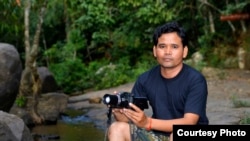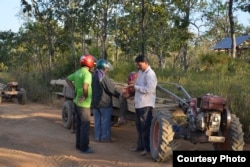Activist Ouch Leng has received international recognition for his work documenting illegal logging and land abuses in Cambodia over the past two decades.
The Goldman Environmental Foundation on Monday announced that Ouch Leng was among six grassroots campaigners from around the world to be awarded the 2016 Goldman Environmental Prize, which recognizes their efforts to protect the environment and means more financial support for their causes.
“It’s an honor for Cambodia and its people,” Ouch Leng told VOA Khmer after hearing about his award.
He dedicated the award to his countrymen who are fighting to preserve Cambodia’s remaining forests in the face of rampant illegal logging and damaging government policies.
“I would like to appeal to the government to reform its environmental protection policy to ensure the forest is saved for the next generation,” he said.
“I promise to utilize resources and knowledge to continue the fight and preserve the forest, and I call on people to stand up against illegal loggers, while the government is blindly allowing it to happen.”
The endorsement is all the more meaningful given Ouch Leng’s life story, which mirrors Cambodia’s own journey from the horrors of the Khmer Rouge regime through years of poverty to the ongoing crisis of landlessness.
Ouch Leng was born in the 1970s in rural Takeo province to a family of peasant farmers. The family survived the Khmer Rouge regime by hiding out in the forests just south of Phnom Penh. His memory of the sanctuary the wilderness provided at that time would drive Ouch Leng later in life to strive to conserve Cambodia’s forests.
When the war was over, Ouch Leng’s family found themselves landless, and moved to Phnom Penh in the early 1980s. “My mother became beggar with mental illness,” he recalled, “while my father worked as cyclo pedaler to earn a living and support my studies.”
Left largely on his own, Ouch Leng would work Phnom Penh’s streets collecting garbage to make small amounts of money that helped fund his education, he said. He made an arrangement where he could attend school if he helped out the teachers and cleaned the classrooms.
Despite this adversity, Ouch Leng graduated high school in 1993 and won a scholarship to study law at the Royal University of Law and Economics. Since completing his degree in 1997, he has dedicated himself to addressing what he saw as Cambodia’s two most damaging problems: land grabbing and deforestation.
Under a program intended to draw investment in industrial-scale agricultural projects, the government has since the early 2000s issued hundreds of economic land concessions, or ELCs, to private companies and individuals.
Corruption and poor oversight of this program led to mass evictions—often enforced through state violence—as well as deforestation when concessions were handed out for areas covered by forest. Additionally, concessions have been used as a cover for illegal logging in supposedly protected forests, with illegal timber smuggled into concession areas and passed off as legally felled wood.
Ouch Leng’s approach to this problem was to shine a light on the murky goings in the forests.
He went undercover, posing at various times as laborer, timber dealer, driver, tourist and cook to document illegal logging. He went after Cambodia’s largest timber magnate, Try Pheap, publishing photo and video evidence of the plunder that went unimpeded thanks to links between loggers and high-level government officials.
Doing so has meant taking considerable risks with his own safety.
In 2012, Ouch Leng’s sometime colleague Chut Wutty was gunned down while guiding journalists to investigate forestry crimes in Koh Kong province. And in November last year, a park ranger and a police officer were gunned down in Preah Vihear province while patrolling forests for illegal logging and poaching. Ouch Leng has been subjected to threats against himself and his family that have forced him into hiding more than once.
Despite the perilousness of confronting those involved in deforestation in Cambodia, he promotes an approach to conservation that mobilizes communities to stand up to loggers and authorities.
“We all work voluntarily as a community because of the unresponsiveness from the government to help us,” said Ouch Leng, who founded the Cambodia Human Rights Task Force, and has also worked with the country’s established rights groups Adhoc and Licadho.
The work of Ouch Leng and others has gained some traction in recent years, and the government has begun to respond. In 2013, the government called an end to the policy of awarding economic land concessions, and later returned some land to its former occupiers.
He vows to keep up his work, however. “I am going to live up to this recognition,” he told VOA Khmer of the award. “I call upon the people of Cambodia to join me and the community to protect our forest for younger generations.”









